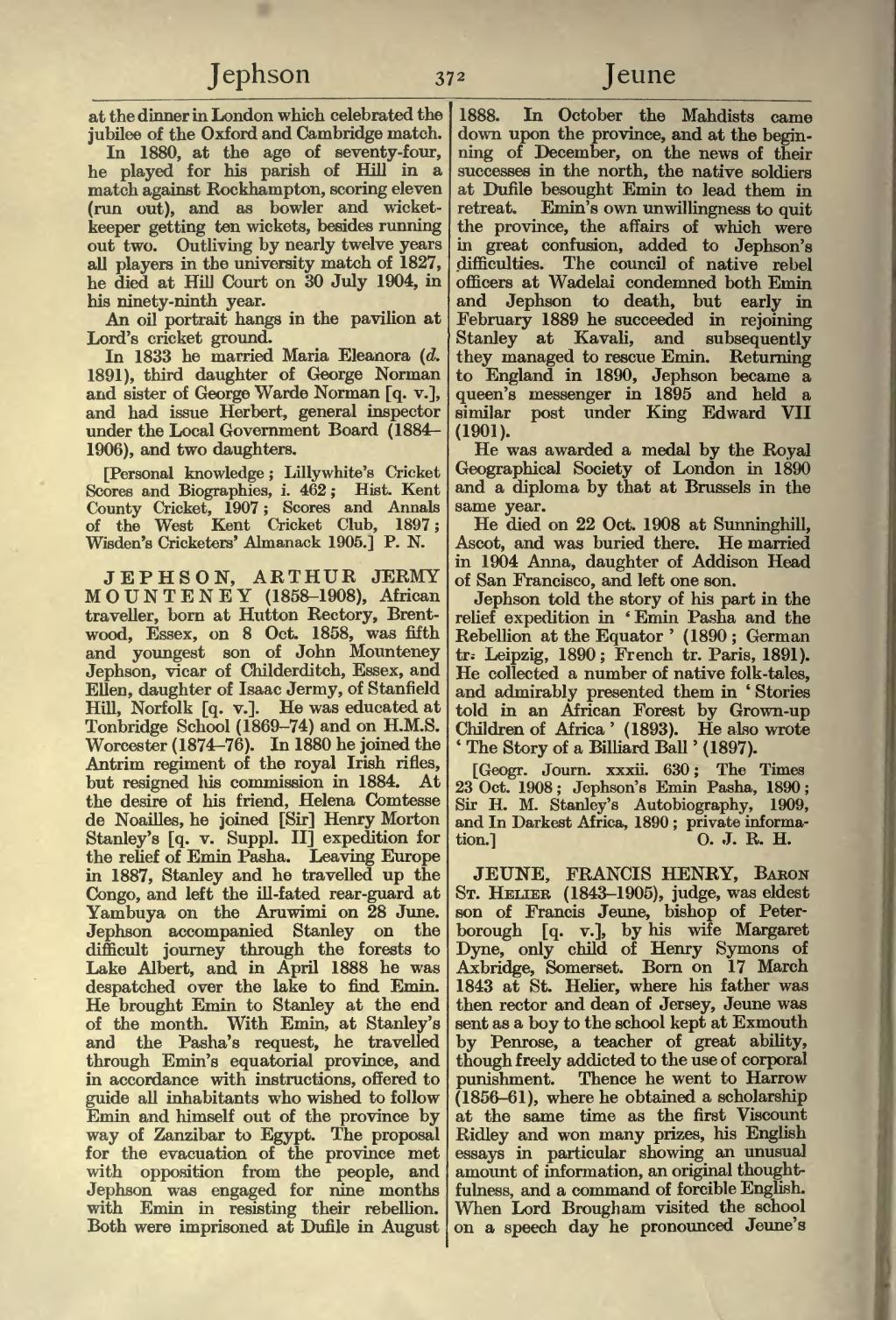at the dinner in London which celebrated the jubilee of the Oxford and Cambridge match. In 1880, at the age of seventy-four, he played for his parish of Hill in a match against Rockhampton, scoring eleven (run out), and as bowler and wicket-keeper getting ten wickets, besides running out two. Outliving by nearly twelve years all players in the university match of 1827, he died at Hill Court on 30 July 1904, in his ninety-ninth year.
An oil portrait hangs in the pavilion at Lord's cricket ground.
In 1833 he married Maria Eleanora (d. 1891), third daughter of George Norman and sister of George Warde Norman [q. v.], and had issue Herbert, general inspector under the Local Government Board (1884-1906), and two daughters.
[Personal knowledge; Lillywhite's Cricket Scores and Biographies, i. 462; Hist. Kent County Cricket, 1907; Scores and Annals of the West Kent Cricket Club, 1897; Wisden's Cricketers' Almanack 1905.]
JEPHSON, ARTHUR JERMY MOUNTENEY (1858–1908), African traveller, born at Hutton Rectory, Brentwood, Essex, on 8 Oct. 1858, was fifth and youngest son of John Mounteney Jephson, vicar of Childerditch, Essex, and Ellen, daughter of Isaac Jermy, of Stanfield Hill, Norfolk [q. v.]. He was educated at Tonbridge School (1869–74) and on H.M.S. Worcester (1874–76). In 1880 he joined the Antrim regiment of the royal Irish rifles, but resigned his commission in 1884. At the desire of his friend, Helena Comtesse de Noailles, he joined [Sir] Henry Morton Stanley's [q. v. Suppl. II] expedition for the relief of Emin Pasha. Leaving Europe in 1887, Stanley and he travelled up the Congo, and left the ill-fated rear-guard at Yambuya on the Aruwimi on 28 June. Jephson accompanied Stanley on the difficult journey through the forests to Lake Albert, and in April 1888 he was despatched over the lake to find Emin. He brought Emin to Stanley at the end of the month. With Emin, at Stanley's and the Pasha's request, he travelled through Emin's equatorial province, and in accordance with instructions, offered to guide all inhabitants who wished to follow Emin and himself out of the province by way of Zanzibar to Egypt. The proposal for the evacuation of the province met with opposition from the people, and Jephson was engaged for nine months with Emin in resisting their rebeliion. Both were imprisoned at Dufile in August 1888. In October the Mahdists came down upon the province, and at the beginning of December, on the news of their successes in the north, the native soldiers at Dufile besought Emin to lead them in retreat. Emin's own unwillingness to quit the province, the affairs of which were in great confusion, added to Jephson's difficulties. The council of native rebel officers at Wadelai condemned both Emin and Jephson to death, but early in February 1889 he succeeded in rejoining Stanley at Kavali, and subsequently they managed to rescue Emin. Returning to England in 1890, Jephson became a queen's messenger in 1895 and held a similar post under King Edward VII (1901).
He was awarded a medal by the Royal Geographical Society of London in 1890 and a diploma by that at Brussels in the same year.
He died on 22 Oct. 1908 at Sunninghill, Ascot, and was buried there. He married in 1904 Anna, daughter of Addison Head of San Francisco, and left one son. Jephson told the story of his part in the relief expedition in 'Emin Pasha and the Rebellion at the Equator' (1890; German tr.- Leipzig, 1890; French tr. Paris, 1891). He collected a number of native folk-tales, and admirably presented them in 'Stories told in an African Forest by Grown-up Children of Africa' (1893). He also wrote 'The Story of a Billiard Ball' (1897).
[Geogr. Journ. xxxii. 630; The Times 23 Oct. 1908; Jephson's Emin Pasha, 1890; Sir H. M. Stanley's Autobiography, 1909, and In Darkest Africa, 1890; private information.]
JEUNE, FRANCIS HENRY, Baron St. Helier (1843–1905), judge, was eldest son of Francis Jeune, bishop of Peterborough [q. v.], by his wife Margaret Dyne, only child of Henry Symons of Axbridge, Somerset. Born on 17 March 1843 at St. Helier, where his father was then rector and dean of Jersey, Jeune was sent as a boy to the school kept at Exmouth by Penrose, a teacher of great ability, though freely addicted to the use of corporal punishment. Thence he went to Harrow (1856-61), where he obtained a scholarship at the same time as the first Viscount Ridley and won many prizes, his English essays in particular showing an unusual amount of information, an original thoughtfulness, and a command of forcible English. When Lord Brougham visited the school on a speech day he pronounced Jeune's

